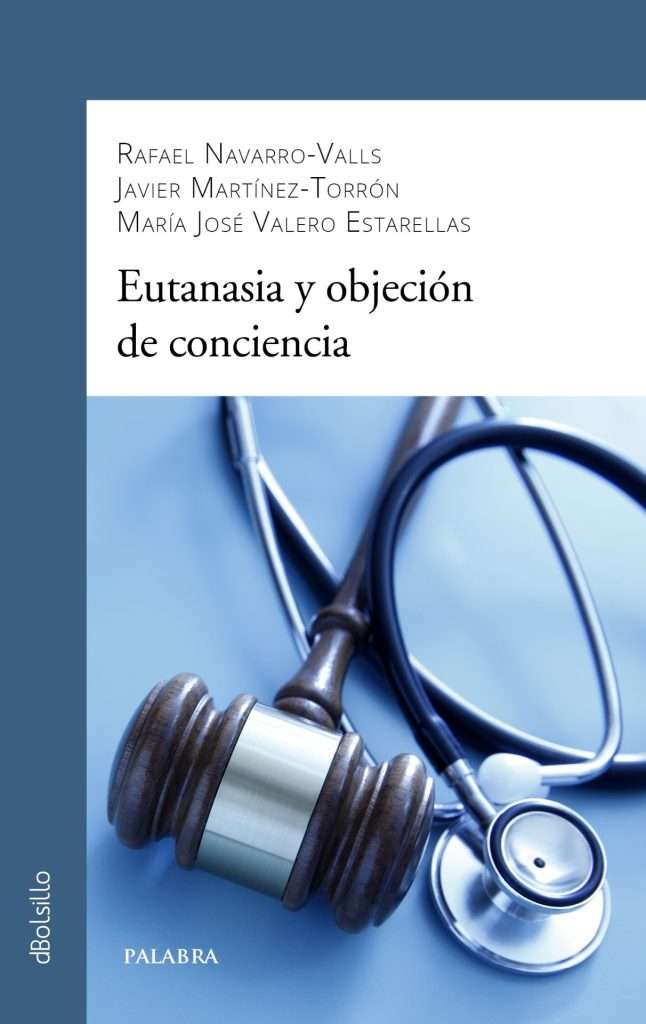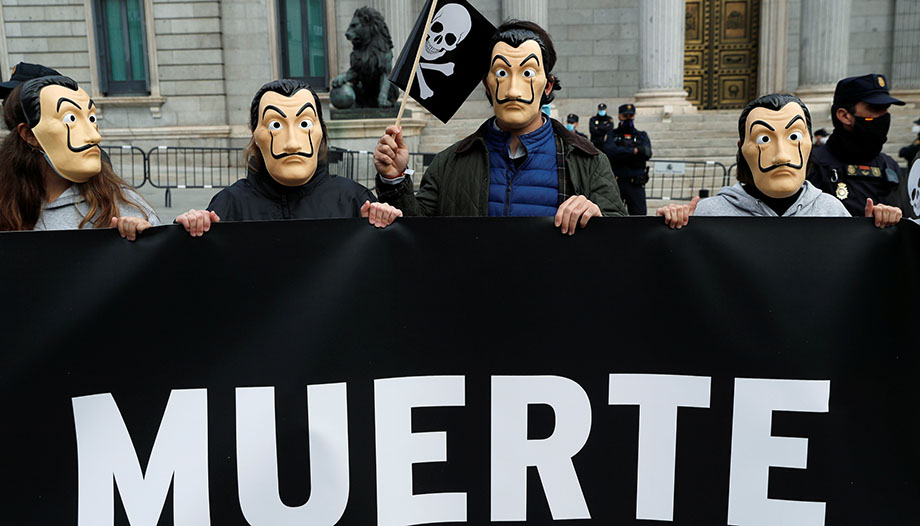Since before its entry into force, and throughout these months, numerous medical professionals and various experts have criticized articles of the organic law regulating euthanasia, which was passed by Parliament in the middle of the pandemic at the initiative of the Socialist group, without consultation or dialogue with civil society, professional associations, or the Committee of Bioethics of Spain. An advisory body remodeled The Committee has been almost entirely reinstated in the middle of the summer by the Minister of Health, and only one member of the former Committee remains on the Committee.

Well, experts from the academic sphere now carry out a systematized analysis, reviewing concepts such as the constitutional and international protection of freedom of conscience, and conscientious objection in comparative law, in the book 'Euthanasia and conscientious objection', recently published by Palabra. It includes, in its final pages, a section entitled 'A law that should be revised as soon as possible', where the authors synthesize aspects developed previously (epigraph 7 and last).
"If a new right has been introduced into the Spanish legal system - the right to die and to be helped to do so - it is natural to refer to the limits that derive from other rights, such as the freedom of conscience of those who could be obliged prima facie to collaborate in this intentionally provoked death", point out the authors, Rafael Navarro-Valls, Javier Martínez-Torrón and María José Valero (pp. 104-105)..
Important ethical issues
Why this reference to freedom of conscience? Numerous reasons could be mentioned, but perhaps these will suffice. The Spanish law "not only decriminalizes euthanasia and assisted suicide, but also transforms the wish of certain persons to die voluntarily into an obligatory and free service provided by the State through its health system and those who work for it" (introduction), as Omnes has been reporting.
Naturally, "no one can be surprised" that "important ethical problems are generated for a large number of health professionals". "These problems are easily understandable since, for many, the notion of medicine is intrinsically linked to the protection of life and health, and in no case justifies its elimination, whatever the reasons given for ending a human life and the lawfulness of such conduct from the perspective of the law" (pp. 13-14). (pp. 13-14).
"In fact," the authors add, "Organic Law 3/2021 itself, as we will see below, regulates conscientious objection by physicians and other health professionals" (art. 16).
Freedom of conscience
"Freedom of conscience is a fundamental right protected both by the Spanish Constitution and by international human rights instruments," And "the latter, since the Universal Declaration of Human Rights, have included 'freedom of thought, conscience and religion' as part of the essential legal heritage of the person, which the State does not grant graciously, but is obliged to recognize and protect," write the jurists.
Other international instruments binding on Spain include the European Convention on Human Rights (art. 9) and the International Covenant on Civil and Political Rights (art. 18), as well as the Charter of Fundamental Rights (art. 10) in the European Union.
The Spanish Constitution does not expressly cite the term "freedom of conscience", but "the Constitutional Court, from the beginning of its work, has been very clear in declaring that 'freedom of conscience is a concretion of the ideological freedom' recognized in Article 16 of the Constitution and that this implies 'not only the right to freely form one's own conscience, but also to act in accordance with the imperatives of the same," point out Navarro-Valls, Martínez-Torrón and Valero.
We could expand on the conflicts between conscience and law, which the pages of the book also address, but it would be better to read it, together with some of the reflections that Navarro-Valls has recently made in El Mundo.
Restrictive attitude toward freedom and objection
Article 16 on conscientious objection is the subject of a detailed analysis in the book. Before stating their request to revise the law, the authors note that the text "literally indicates that health professionals may exercise their right to conscientious objection, as if it were a gracious concession from the legislator. pro bono pacisto avoid problems with professionals who, in a very high percentage, had expressed their opposition to this law, and whose professional associations had not been consulted during the legislative process".
"Indeed," in his opinion, "the text of article 16 seems to show a distrust of the legislator towards this fundamental right. As if it recognizes it because it has no other choice, but is more concerned with outlining its operational limitations than its legal guarantees".
For example, paragraph 1 restricts the exercise of the right to "health professionals directly involved in the provision of assistance in dying". And it discusses what is to be understood by 'health professionals' and another reflection on the concept of 'directly involved'. It also recalls that "the Spanish Bioethics Committee, on the basis that the so-called 'provision of aid in dying' cannot in any case be conceptualized as a medical act, but simply as a healthcare act, affirms that the expression 'healthcare professionals' should be interpreted in a broad sense", and not be restricted to "those who intervene directly in the act...".
Suggestions for a revision of the law
In sections 5 and 6 of the book, the experts point out aspects of the current Spanish regulations that, in their opinion, "need to be modified". At the end, they summarize some of them as follows
–"Review and amend the text of the current Organic Law 3/2021 through a procedure that runs in frank dialogue and collaboration with civil society."These include professional associations, other types of social actors, jurists with experience in the protection of freedom of conscience and health law, bioethicists (including the Spanish Bioethics Committee), representatives or persons with moral authority in the main religious denominations operating in Spain, etc.
"This process should have been carried out prior to the enactment of the law. The strong criticisms raised by a text that can clearly be improved should make the government reflect on the importance of undertaking the revision of the law as soon as possible," they add.
During the parliamentary procedure, in the Senate, according to the authors, "the most critical voices came from the spokesman of the Izquierda Confederal Group, Koldo Martinez (intensivist physician, from Geroa Bai), who reminded the government of 'the lack of legal certainty' of the new regulations. 'The law is deficient, it is written with very little quality and leads to enormous confusion,' he assured." (pp. 56-57).
–"The register of objectors should be eliminated, due to the foreseeable dissuasive and inhibiting effect that it can have -and in fact seems to be having in some places in Spain-, on the freedom of conscience of health personnel in such delicate and transcendental material".
The authors go on to suggest doing it the other way around. That is, "in view of the widespread rejection of the law by health professionals, the current registry may well be replaced at this time by a database containing (confidential) information on individuals and teams willing to participate in the provision of aid in dying."
The latest published data show that in Spain, up to July, around 175 euthanasiasand that the number of registered conscientious objectors exceeds 4,000.
-A third suggestion, "of special significance, both theoretical and practical," is to "expressly recognize the possibility of institutional objection to the practice of euthanasia and assisted suicide in the case of private institutions, whether for profit or not-for-profit, whose ethical ideology is contrary to such actions".
In the case of religious denominations, "their autonomy has been clearly recognized internationally. And in other types of institutions, "including for-profit institutions, comparative jurisprudence is beginning to show sensitivity in recognizing the importance of their identity including moral values that determine their actions, and those of those who work for them".
In July of last year, Federico de Montalvo, professor of law at Comillas Icade and president of the Spanish Bioethics Committee until a few weeks ago, considered in an interview with Omnes that denying conscientious objection to the law on euthanasia exercised by institutions and communities "is unconstitutional". to recognize as an organic law the entire article 16 of the law, without excluding its first paragraph, since it all refers to the development of the freedom of conscience protected by the Constitution".







